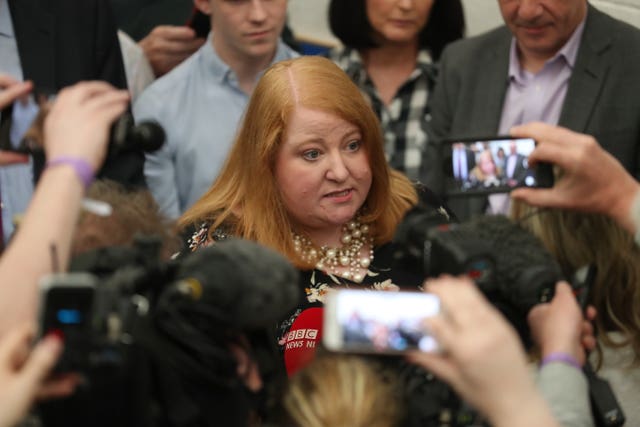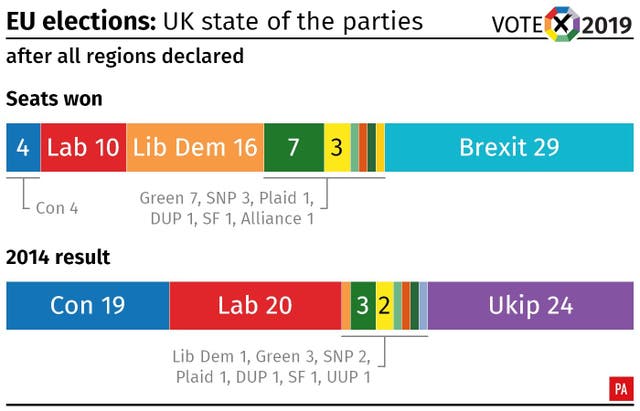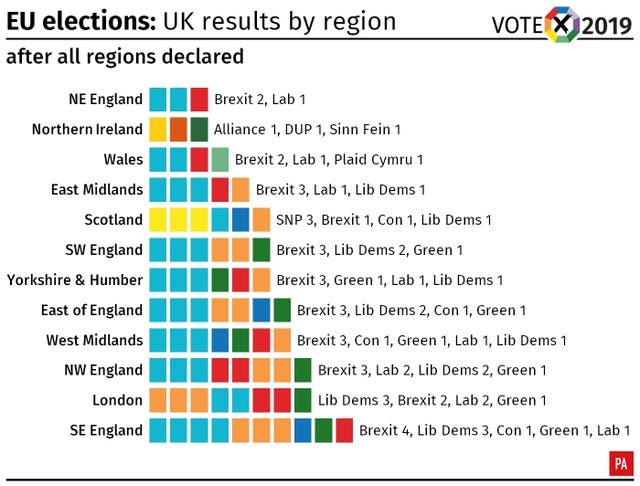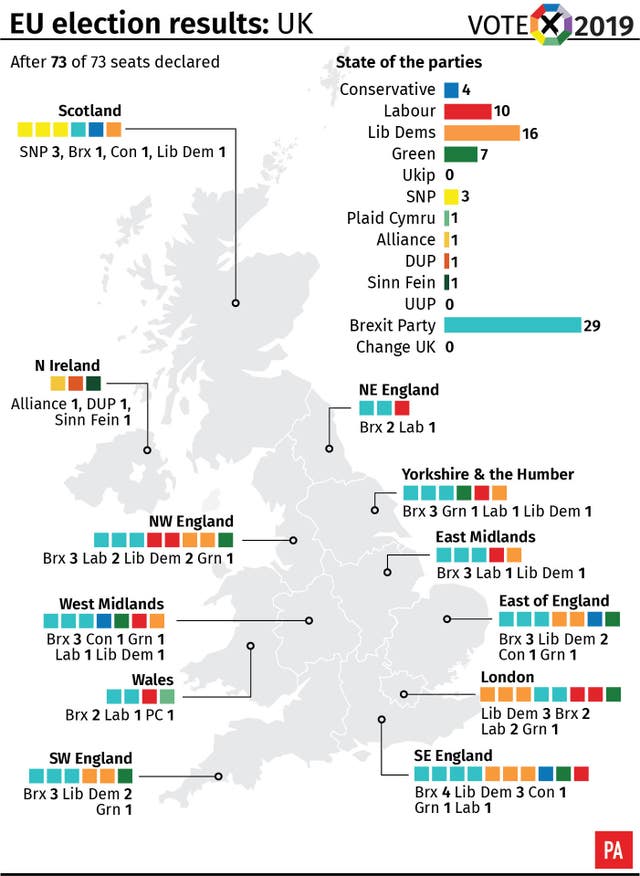Labour and Tories’ Brexit policies dealt a hammer blow in European elections
Prime Minister Theresa May said it was a ‘very disappointing night’ for the Conservatives.

Labour and the Conservatives’ Brexit policies were dealt a hammer blow by voters in a terrible night for both parties in the European elections.
The Brexit Party and the Liberal Democrats triumphed, but the scale of disaster for the main parties was laid bare as the final results for Great Britain were announced.
The Tories secured just 9.1% of the vote – their worst ever national election share – while Labour finished on 14.1%, with voters split between the clear Brexit alternatives offered by Nigel Farage’s new party and the pro-EU Liberal Democrats.
Just four Conservatives were elected in England, Scotland and Wales, while the Brexit Party had 29 seats, overtaking the 24 MEPs that Mr Farage’s former party Ukip sent to the European Parliament in 2014.
The Lib Dems, reduced to just a single MEP in 2014, were on 16 after their best ever European results.
Labour had 10, halved from 20, the Greens – who also enjoyed a boost from pro-EU voters – were on seven, up from three in 2014.

Northern Ireland, which voted 56% Remain in the 2016 referendum, returned two Remain-supporting MEPs and one Brexiteer.
The Ulster Unionist Party was ousted by the cross-community pro-Remain Alliance Party, with leader Naomi Long left speechless by a best ever performance that was “beyond expectations”.
Mrs Long won 106,000 first-preference votes, while Sinn Fein’s Martina Anderson topped the poll with 126,951 votes and the DUP’s MEP Diane Dodds registered 124,991 first preferences.

Voter turnout in Great Britain was the second highest for an EU election, but still low at 36.7%.
Prime Minister Theresa May said it was a “very disappointing night” for the Conservatives.
“Some excellent MEPs have lost their seats, some excellent candidates missed out. But Labour have also suffered big losses.
“It shows the importance of finding a Brexit deal, and I sincerely hope these results focus minds in Parliament.”
First Minister Nicola Sturgeon said the result for the SNP, who won three seats, was “historic”, adding: “Scotland has spoken – we are not for Brexit.”
Results for Northern Ireland are expected on Monday evening.
Mr Farage told the Press Association he was getting ready to fight a general election, warning that his Brexit Party could “stun everybody” if Britain had not left the EU by the next national contest.
“We’re not just here to leave the European Union but to try and fundamentally change the shape of British politics, bring it into the 21st century and get a Parliament that better reflects the country,” he said.
Divisions in Labour were laid bare following the results, with Sir Keir Starmer, Emily Thornberry and Tom Watson calling for the party to rethink its position – but Jeremy Corbyn said a general election remained his priority.
“The priority at the moment, I think, is for this Government to call for a general election and actually have a general election so we can decide the future,” Mr Corbyn told reporters.
However shadow Brexit secretary Sir Keir said the “only way to break the Brexit impasse” was to “go back to the public with a choice between a credible leave option and remain”.

Foreign Secretary and Tory leadership hopeful Jeremy Hunt said the dire results for the Conservatives meant the party faced an “existential risk” unless it delivered Brexit.
Home Secretary Sajid Javid, another potential leadership contender, said the “hugely disappointing” results were a “clear lesson” that the public wants the Government to get on with delivering Brexit.
Tatton MP Esther McVey, who has also launched a leadership bid, claimed voters had delivered the Tories’ “worst national election results ever” because they wanted a clean break.
She said: “The message from our voters is clear – we must leave the EU on October 31 with a clean break, nothing else will wash now.
“People saying we need a Brexit policy to bring people together are misreading the situation. That is clearly not possible.”
Prominent Brexiteer and MEP Daniel Hannan, who managed to cling on to his seat in the South East, told the Press Association it was “without question our worst result as a party ever”.
In a sign of how embarrassing the results were for Labour, the Lib Dems topped the poll in Islington, in north London – where both Mr Corbyn and Ms Thornberry are MPs.
Shadow foreign secretary Ms Thornberry – who was sent onto the BBC to represent her party’s position – instead said Labour got a “kicking” because “we went into an election where the most important issue was ‘what was our view on leaving the European Union’ and we were not clear about it”.
Deputy Labour leader Mr Watson said: “Following the disastrous EU election results, Labour urgently needs to re-think its Brexit position and realign with members and voters.”
He urged members to take part in a survey on his website to set out how they wanted to influence Labour’s policy.
The Liberal Democrats attracted Remain-supporting voters from across the political spectrum, including former Labour spin doctor Alastair Campbell and former Tory deputy prime minister Lord Heseltine.

Lib Dem leader Sir Vince Cable said: “Our clear, honest, unambiguous message has won us our best ever European election result, and pushed Corbyn’s Labour into third place.”
He said the results were a message for Labour to “get off the fence” over Brexit.
The Green Party finished above the Conservatives for the first time in a national election.
Co-leader Sian Berry said: “There is clear evidence from this of strong support for the UK remaining in the European Union, but also for tackling the causes of Brexit – the massive damage done to so many communities by austerity, tax-dodging and diminution of workers’ rights.”
The results across Europe suggest a decline in the main centre-right and centre-left groupings in the European Parliament, with a boost for the Liberals, Greens and nationalists.





